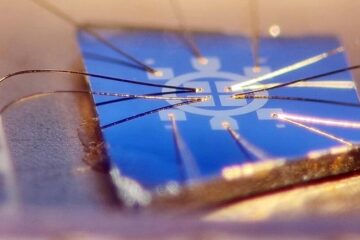SEAL – A Powerful Joint European Project to Foster the European Semiconductor Equipment Industry

The objective of this project is to speed up the market maturity of innovative and production-ready equipment and to foster cost-efficient equipment development in strong cooperation with equipment users, materials manufacturers, and IC manufacturers.
SEAL supports networking and cooperation between equipment producers and users as well as creates synergies between all partners to be successful in a global market. In total, 38 project partners, consisting of major European semiconductor equipment manufacturers, the materials manufacturers, the major IC manufacturers, innovative start-ups, and well-known research institutes, started the joint EC-funded project SEAL on semiconductor equipment development and assessment. The coordinator of the project is the Fraunhofer Institute for Integrated Systems and Device Technology IISB in Erlangen, Germany. The IISB has broad experience in coordination of such big projects and has already successfully coordinated the predecessor project SEA-NET.
Semiconductor equipment is required for the production of all kind of semiconductor devices like microprocessors, memories, MEMS, or sensors. Nearly in every electrical device, machine, and facility, these semiconductor devices or chips are inevitable for controlling, storage, display, or measuring.
Examples are mobile phones, PCs, or cars. Innovative semiconductor manufacturing equipment is the key for the production of such chips or devices with steadily increasing functionality, energy efficiency, and performance. The investment for a leading edge semiconductor manufacturing plant is today about 3 billion Euro. About three quarters of this investment is covered by equipment. To foster the development of innovative equipment and to shorten the time to make this equipment ready for production, and finally to foster the European semiconductor equipment industry in a global market, are the ambitious goals of SEAL.
Some facts on SEAL:
– 18 different production and metrology equipment systems of the latest technology are developed and assessed in a new joint approach.
– SEAL combines advanced R&D topics with equipment assessment involving a wide community of equipment suppliers, material manufacturers, semiconductor manufactures, and research institutes.
– SEAL integrates renowned R&D institutes to provide dedicated development support and innovative approaches covering equipment and process characterization, virtual metrology, application of advanced process control, and discrete event simulation.
– SEAL will strengthen the European equipment manufacturing industry in an efficient and sustainable way.
– SEAL especially strengthens the small and medium sized companies (SMEs) by establishing a valuable network with European materials manufacturers, major semiconductor manufacturers, and research institutes. Over one third of the equipment suppliers are SMEs.
– SEAL will enhance the prospects for the successful introduction of proven leading-edge European equipment to the global market place.
SEAL is a three-year project with a total budget of more than 14 Mio Euro with considerable funding of 9 Mio Euro.
For more information please contact:
Prof. Dr. Lothar Pfitzner / Dr. Richard Öchsner
Fraunhofer IISB
Schottkystraße 10, 91058 Erlangen, Germany
www.iisb.fraunhofer.de
Tel. +49-9131-761-110 / Tel. +49-9131-761-116
lothar.pfitzner@iisb.fraunhofer.de / richard.oechsner@iisb.fraunhofer.de
Media Contact
All latest news from the category: Materials Sciences
Materials management deals with the research, development, manufacturing and processing of raw and industrial materials. Key aspects here are biological and medical issues, which play an increasingly important role in this field.
innovations-report offers in-depth articles related to the development and application of materials and the structure and properties of new materials.
Newest articles

Boron deficiency: oilseed rape reacts as with infection and pest infestation
Genetic mechanisms uncovered… Boron deficiency has a devastating effect on oilseed rape and related plants. However, little is known about the underlying genetic mechanisms. A study shows that the response…

Quantum Precision: A New Kind of Resistor
Researchers at the University of Würzburg have developed a method that can improve the performance of quantum resistance standards. It´s based on a quantum phenomenon called Quantum Anomalous Hall effect….

Security vulnerability in browser interface
… allows computer access via graphics card. Researchers at Graz University of Technology were successful with three different side-channel attacks on graphics cards via the WebGPU browser interface. The attacks…





















